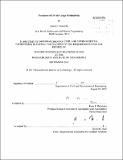Evolution of US air cargo productivity
Author(s)
Donatelli, David J
DownloadFull printable version (16.97Mb)
Alternative title
Evolution of United States air cargo productivity
Other Contributors
Massachusetts Institute of Technology. Dept. of Civil and Environmental Engineering.
Advisor
Peter P. Belobaba.
Terms of use
Metadata
Show full item recordAbstract
This thesis provides an overview of the US air cargo industry since airline deregulation in 1978, including a brief overview of the historical evolution of air cargo transport in the US from the early 1900s until the late 1970s and a discussion about the major international factors affecting global air cargo. A deeper analysis of the US air cargo industry follows these background discussions, emphasizing the growth of all-cargo carrier traffic in the past 30 years while noting the decline of combination carrier traffic within the past decade. Furthermore, operating cost analyses for the past 20 years reveal that major improvements in labor productivity have helped all-cargo carriers and combination carriers decrease unit costs, even while the price of fuel has risen dramatically. Productivity of US air cargo carriers is explored from 1990 to 2010 through two types of metrics, single-factor productivity (SFP) and multi-factor productivity (MFP). SFP metrics measure an airline's ability to turn inputs, such as fuel, labor, and capital, into outputs, such as available ton-miles (ATMs) and revenue ton-miles (RTMs). The MFP metric presented measures how effectively an airline produces an output from multiple inputs, essentially combining the SFP metrics. Single-factor productivity results show that the US air cargo industry has made significant improvements in labor productivity and capital productivity, with minor improvements in fuel productivity. FedEx and UPS have achieved the smallest improvements over the past 20 years, while other all-cargo carriers and combination carriers realized substantial advancements in the past two decades. Multi-factor productivity results echo the SFP results. Over the past 20 years, FedEx and UPS improved MFP 18%, combination carriers became approximately twice as productive, and the other all-cargo carriers increased MFP dramatically. However, questionable data reported by all-cargo carriers and methods used to determine only cargo-related data for combination carriers limit the accuracy of these results and caused difficulties calculating productivity throughout this thesis.
Description
Thesis (S.M. in Transportation)--Massachusetts Institute of Technology, Dept. of Civil and Environmental Engineering, 2012. Cataloged from PDF version of thesis. Includes bibliographical references (p. 131).
Date issued
2012Department
Massachusetts Institute of Technology. Department of Civil and Environmental EngineeringPublisher
Massachusetts Institute of Technology
Keywords
Civil and Environmental Engineering.